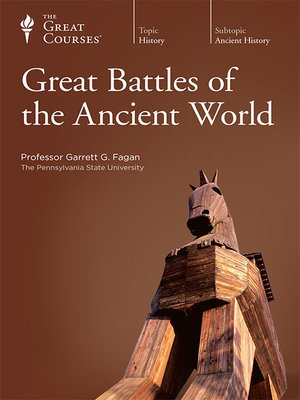
Sign up to save your library
With an OverDrive account, you can save your favorite libraries for at-a-glance information about availability. Find out more about OverDrive accounts.
Find this title in Libby, the library reading app by OverDrive.



Search for a digital library with this title
Title found at these libraries:
| Library Name | Distance |
|---|---|
| Loading... |
Forget Hollywood's portrayal of violence and mayhem in ancient warfare and find out what the ancient battles were really like. What were the weapons, tactics, armor, training, and logistics? What were the crucial factors that could turn the tide of battle, giving one side victory and the other defeat? In 24 exciting lectures, Professor Fagan introduces you to the many fateful battles that became crucibles of history: the fearsome clash between the Athenians and the invading Persian army at the Marathon, Alexander the Great's crushing hammer-and-anvil tactics against the Persians at Gaugemela, and the Roman mastery of siege warfare at the Jewish fortress of Masada. Encompassing the region from Mesopotamia to western Europe-including Egypt and Northern Africa-this course charts the development of warfare from prehistoric times and examines battles and warfare from the city-states of early Sumer to the fearsome Assyrian war machine, the Greeks' distinctive form of combat, the Persian invasions, and the legions of Rome, which evolved brutally effective tactics that gained them dominion over the entire Mediterranean basin. Although the battles you study were fought long ago, considerable controversy exists among contemporary historians. Professor Fagan presents contending theories without losing sight of the grim realities of war, and the many millions who have died on the battlefields. "We owe it to them," he concludes, "and to the thousands who continue to perish in our planet's wars, to understand as fully as possible what it was that killed them. If this course has advanced its audience's comprehension of war even a little, then it has amply fulfilled its purpose."







